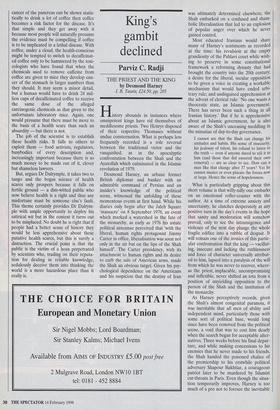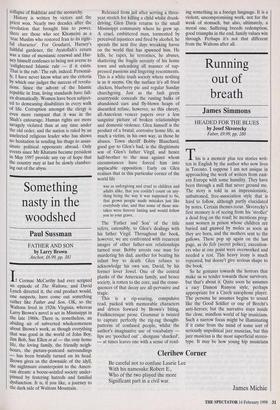King's gambit declined
Parviz C. Radji
THE PRIEST AND THE KING by Desmond Harney I. B. Tauris, £24.50, pp. 205 History abounds in instances where omnipotent kings have rid themselves of meddlesome priests. Two Henrys disposed of their respective Thomases without undue consternation. What is perhaps less frequently recorded is a role reversal between the traditional victor and the vanquished, as in the apocalyptic confrontation between the Shah and the Ayatollah which culminated in the Islamic revolution of 1979.
Desmond Harney, an urbane former British diplomat and banker with an admirable command of Persian and an insider's knowledge of the political scene, witnessed the unfolding of these momentous events at first hand. While his diaries only begin after the Jaleh Square `massacre' on 8 September 1978, an event which marked a watershed in the fate of the monarchy, as early as 1976 his astute political antennae perceived that 'with the liberal, human rights protagonist Jimmy Carter in office, liberalisation was soon not only in the air but on the lips of the Shah himself. The Carter presidency, with its attachment to human rights and its desire to curb the sale of American arms, made the Shah an obvious target. Given his psy- chological dependence on the Americans and his suspicion that the destiny of Iran was ultimately determined elsewhere, the Shah embarked on a confused and sham- bolic liberalisation that led to an explosion of popular anger over which he never gained control.
Most educated Iranians would share many of Harney's sentiments as recorded at the time: his revulsion at the empty grandiosity of the Pahlavi court while wish- ing to preserve in some constitutional framework a reforming dynasty that had brought the country into the 20th century; a desire for the liberal, secular opposition to be given a voice in creating a workable mechanism that would have ended arbi- trary rule; and undisguised apprehension at the advent of clerical rule: 'No one wants a theocratic state, an Islamic government. There has never been such a thing in all Iranian history.' But if he is apprehensive about an Islamic government, he is also aware of the Shah's unceasing meddling in the minutiae of day-to-day governance.
I cannot see that the Shah can change his attitudes and habits. His sense of insecurity, his jealousy of talent, his refusal to listen to the truth — even if anyone dared to tell it to him (and those that did ensured their own removal) — are so clear to see. How can a man like that change after 37 years? Yet he cannot master or even placate the forces now at large. Hence the sense of hopelessness.
What is particularly gripping about this short volume is that willy-nilly one embarks on an emotional roller-coaster with the author. At a time of extreme anxiety and uncertainty, he clutches desperately at any positive turn in the day's events in the hope that sanity and moderation will somehow prevail, only to see the intransigence and violence of the next day plunge the whole fragile edifice into a rubble of despair. It will remain one of the ironies of this partic- ular confrontation that the king — vacillat- ing, insecure and lacking the ruthlessness and force of character universally attribut- ed to him, lapsed into a paralysis of the will from which he was never to recover, where- as the priest, implacable, uncompromising and inflexible, never shifted an iota from a position of unyielding opposition to the person of the Shah and the institution of the monarchy.
As Harney perceptively records, given the Shah's almost congenital paranoia, it was inevitable that all men of ability and independent mind, particularly those with some sort of political base, would long since have been removed from the political scene, a void that was to cost him dearly when the search began for acceptable alter- natives. Three weeks before his final depar- ture, and while making concessions to his enemies that he never made to his friends, the Shah handed the poisoned chalice of the premiership to his erstwhile political adversary Shapour Bakhtiar, a courageous patriot later to be murdered by Islamist cut-throats in Paris. Even though the situa- tion temporarily improves, Harney is too much of a pro not to foresee the inevitable collapse of Bakhtiar and the monarchy.
History is written by victors and the priest won. Nearly two decades after the revolution that brought him to power, there are those who see Khomeini as a `true Muslim who restored Iran to its right- ful character'. For Goudarzi, Hamey's faithful gardener, the Ayatollah's return was a time of messianic renewal and Har- ney himself confesses to being not averse to `enlightened Islamic rule — if it exists. That is the rub.' The rub, indeed. Personal- ly, I have never know what are the criteria by which one judges the success of revolu- tions. Since the advent of the Islamic republic in Iran, living standards have fall- en dramatically. Women have been subject- ed to demeaning disabilities in every walk of life. Corruption amongst the clergy is even more rampant that it was in the Shah's entourage. Human rights are more savagely violated than at any time under the old order, and the nation is ruled by an unelected religious leader who has shown no hesitation in sending his thugs to assas- sinate political opponents abroad. Only events since Mr Khatami became president in May 1997 provide any ray of hope that the country may at last be slowly clamber- ing out of the abyss.


























































 Previous page
Previous page